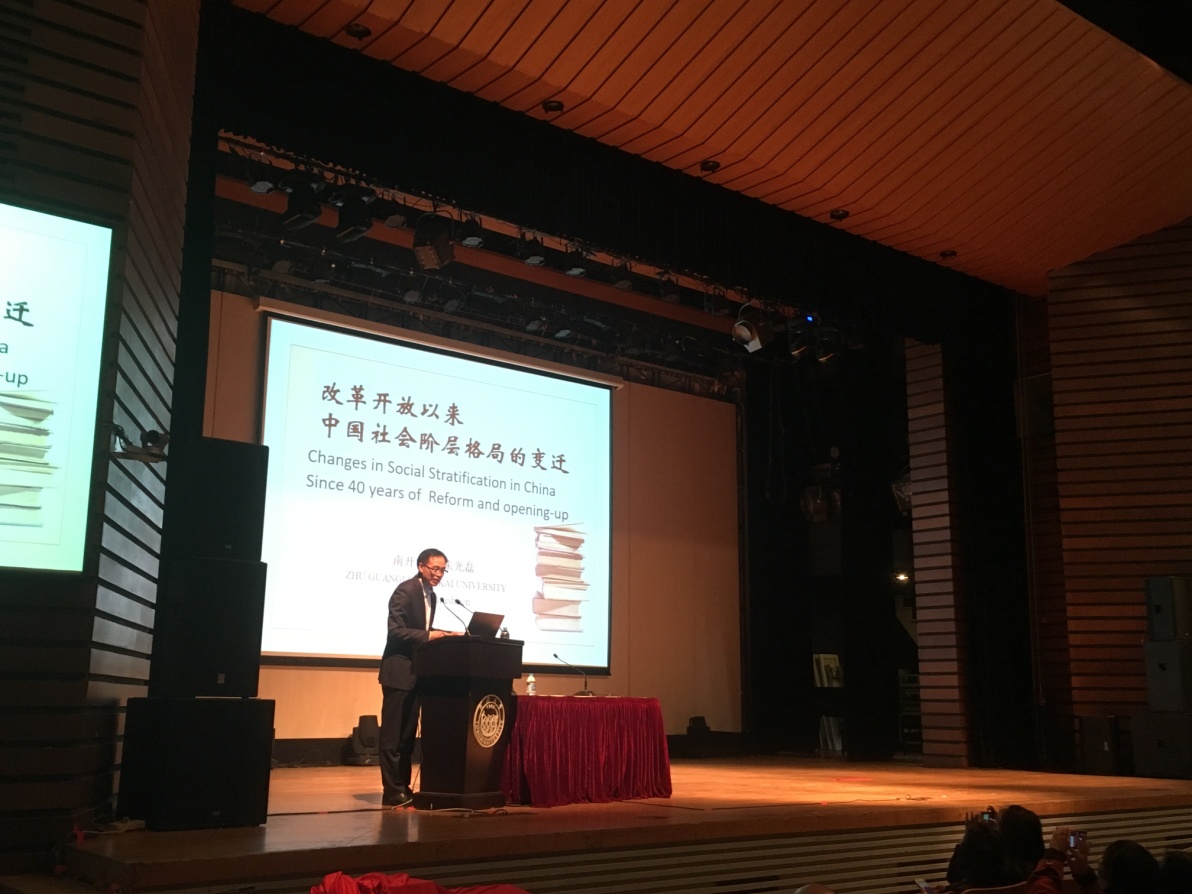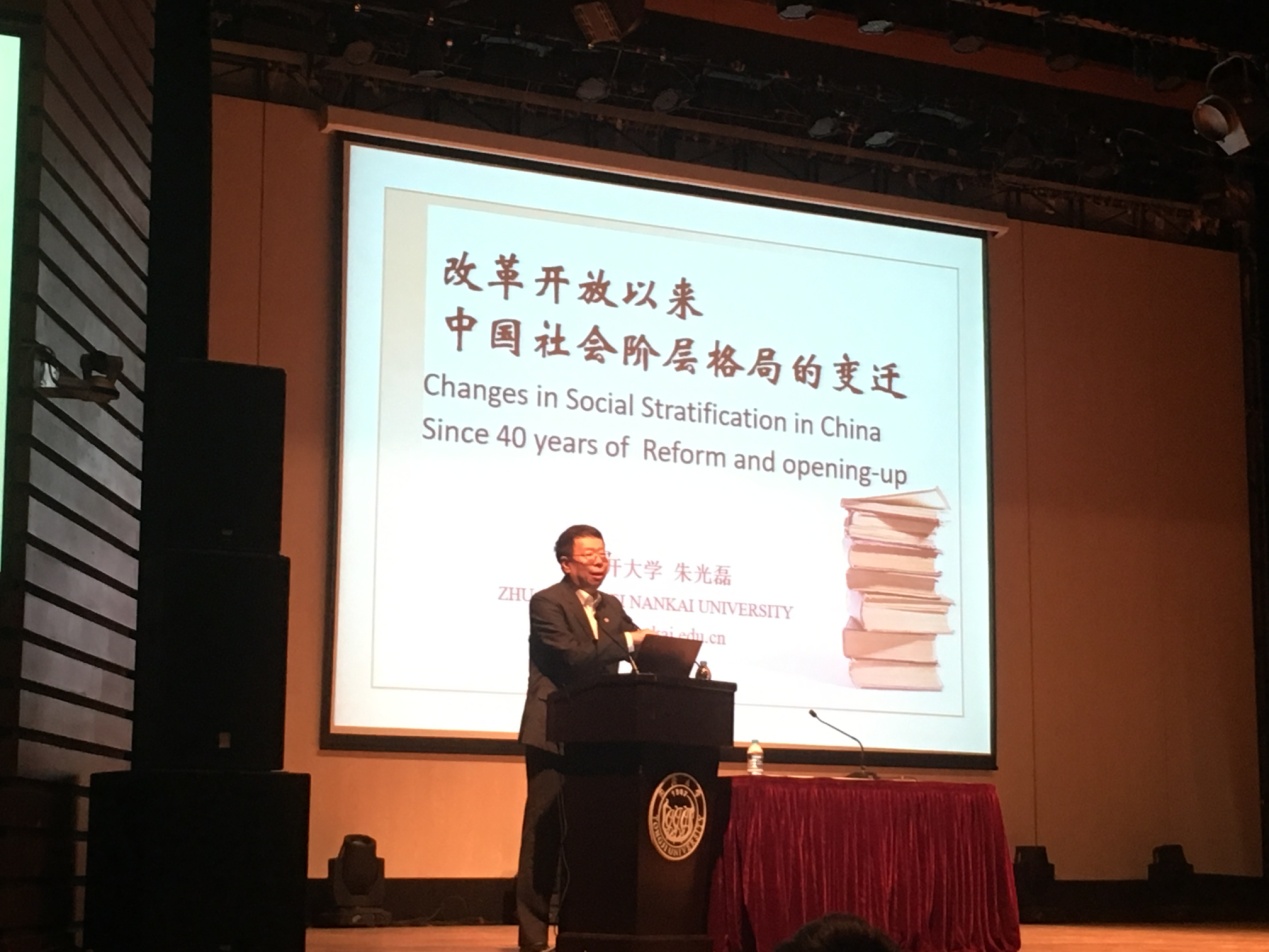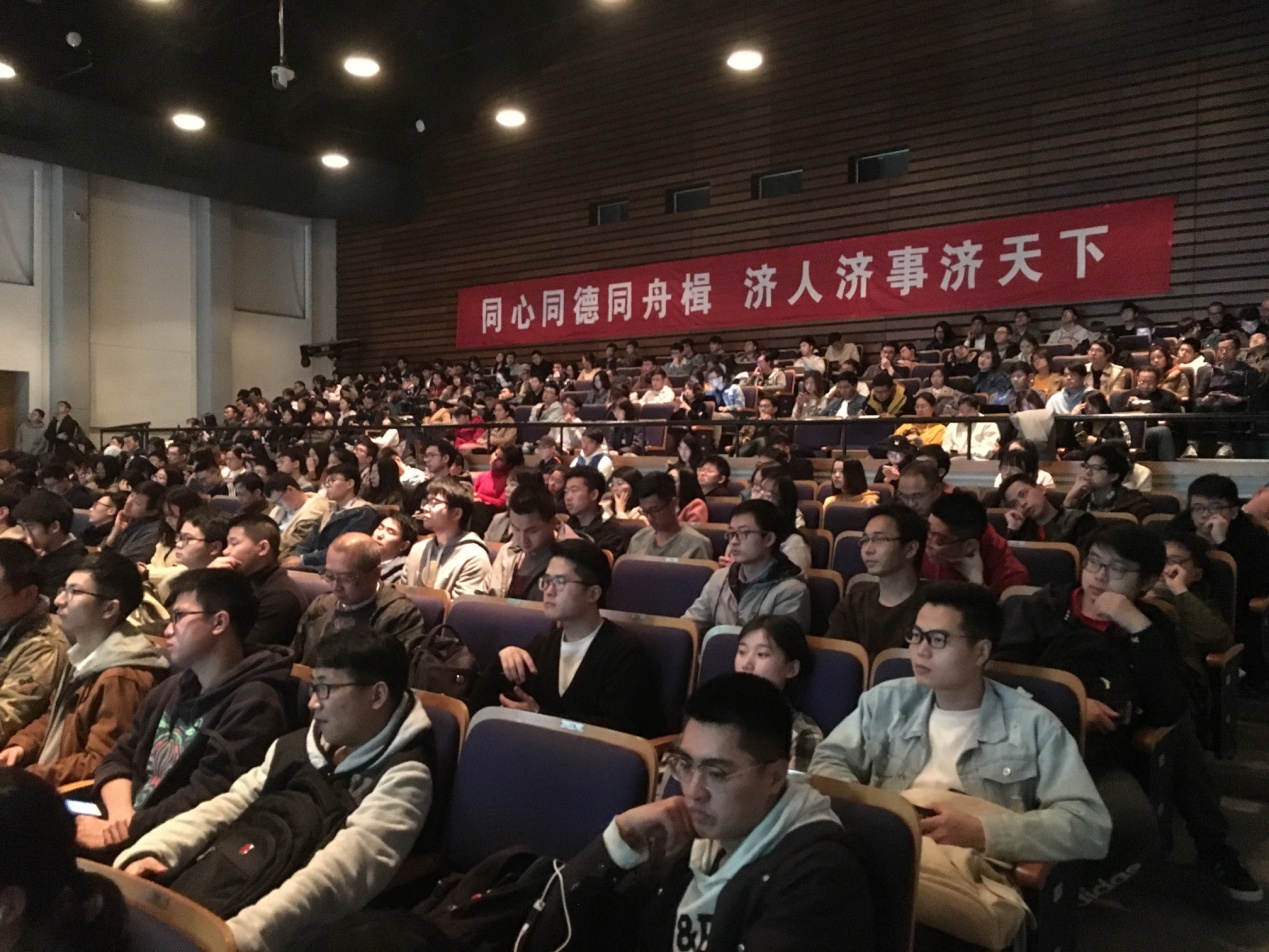
The Tongji Advanced Lectures for Graduate Students No.68 & the Tongji Serial Lectures on Social Sciences No.11 was held in Auditorium 129, Siping Campus, Tongji University on the evening of March 5, 2019. Professor Zhu Guanglei, a well-known political scientist in China, a distinguished professor of the Changjiang Scholars Program, and Vice President of Nankai University, was invited to give a speech on the topic of "Changes in China’s Social Stratification since Reform and Opening Up" for teachers and students of Tongji. Professor Men Honghua, Dean of the School of Political Science & International Relations, Tongji University, moderated this high-level lecture.

First of all, Prof. Zhu discussed several important issues about China's current social stratification, and explained the concept and meaning of "class and stratum" by starting with the social composition of China. He pointed out that in the Chinese context, "class" and "stratum" are two different concepts with relatively clear definition. Stratum analysis needs to be combined with class analysis to overcome such limitations as "queuing" and "capping" in stratification. Social stratum analysis is the basis for the study of Chinese politics, society and economy, and is an important part of China's national conditions. In stratum division, apart from property relations, specific factors such as means of labor, source of income and income level must also be examined.

According to Prof. Zhu, stratum mainly refers to smaller groups within a class, as well as groups formed as a result of intersection of several classes. Prof. Zhu introduced the historical premise of stratification since the reform and opening up: the social composition of a single class division. On this basis, he further introduced the main impetus and conditions for social stratification, namely, the industrial restructuring in the 1980s (industrialization and industrial revolution), the economic diversification in the 1990s (marketization and privatization), and the urbanization since the 2000s. The initial results of political development have made stratification and reorganization a reality. Then, Prof. Zhu proposed an open stratification framework based on the basic structure of China’s social strata, that is, to divide social groups into four types: basic, emerging, revived, and crossover and transition. (1) The basic stratum mainly includes the working class and the peasant class. The working class can be broken down into blue-collar workers, professional and technical personnel, white-collar workers, civil servants, and retired workers; and the peasant class can be broken down into agricultural laborers, village leaders, and rural intellectuals. Prof. Zhu specifically pointed out that the idea that the peasant class accounted for the majority of the working population in China was wrong. In fact, workers became the largest stratum by replacing peasants after 1997. In 2017, China had around 400 million workers, of which about 200 million worked in the primary industry; (2) The emerging stratum includes migrant workers, business operators, and freelancers; (3) The revived stratum includes self-employed workers and private entrepreneurs. Here, Prof. Zhu particularly stressed that private entrepreneurs cannot be equated with capitalists because the former grow up with the help of the CPC and government’s supportive policies, as well as a large number of factors such as mixed economy and community economy; (4) The crossover and transition stratum includes soldiers, college students, and the unemployed.
Next, Prof. Zhu analyzed the eight characteristics of stratification in the modern Chinese society. First, industrial laborers have outnumbered agricultural laborers; second, the strata connected with the non-public economy have been developing rapidly; third, the “amphibious” phenomenon is constantly lingering; fourth, inter-stratum cooperation is the mainstream, but deep-seated contradictions are beginning to emerge; fifth, pressure groups have got over the latent period; sixth, stratification is still contained by factors such as the “unit system”; seventh, overwhelming social mobility coexists with "hierarchical solidification"; eighth, the political gap between strata is narrowing and the economic gap is widening. On this basis, Prof. Zhu discussed the general characteristics of the current strata relations, the social contradictions caused by income distribution, and related problems such as political development and interest group, and interpreted the changes in production mode, means of labor, source of income, income level, cultural structure, and characteristics of political behaviors of various groups.

Based on China’s national conditions, Prof. Zhu explored the issue of strata relations and wealth gap, and elaborated on the evolution of China’s income distribution structure: from a flat flying saucer to a short pyramid and then to a sharp pyramid, and now changing into a gourd. He believed that this structure is derived from the dual economic system and urban-rural gap in China, and it is a result of the combined effect of natural, historical, institutional and policy factors.
Prof. Zhu focused on the political impact of stratification which is closely related to social progress and political development. Stratification can promote the transformation from status to contract and play a positive role in improving and adjusting social composition, thereby creating a growing civil society and preparing the necessary social foundation for democracy and legal system building. Also, stratification has preliminarily changed people's ideological and cultural concepts, leading to a portion of people getting well-off first and also promoting common prosperity. This is in consistent with the worldwide trend of social stratification. Finally, Prof. Zhu made a judgment based on the fundamental realities of China that China's social composition is healthy and its development and changes are positive on the whole. The problems emerging in this process must be tackled through reform, development and adjustment (especially the accelerated urbanization).

More than 600 undergraduate students of Tongji listened to this lecture and asked questions in a lively atmosphere. Prof. Zhu’s in-depth analysis of current social issues has benefited everyone present a lot. He taught the students the problem-solving methods, explained the differences between humanities and social sciences, and guided them to think about social issues correctly. After this lecture, students showed a greater interest in further study of social sciences.






